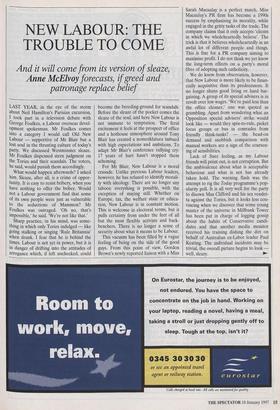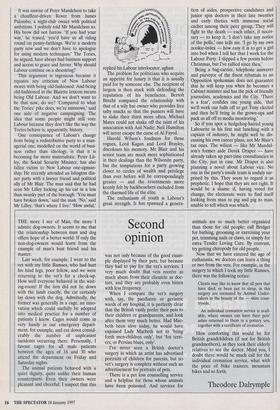NEW LABOUR: THE TROUBLE TO COME
And it will come from its version of sleaze,
Anne McElvoy forecasts, if greed and
patronage replace belief
LAST YEAR, in the eye of the storm about Neil Hamilton's Parisian excursion, I took part in a television debate with George Foulkes, a Labour overseas devel- opment spokesman. Mr Foulkes comes into a category I would call Old New Labour — supportive of Mr Blair but a lost soul in the thrusting culture of today's party. We discussed Westminster sleaze. Mr Foulkes dispensed stern judgment on the Tories and their scandals. The voters, he said, would punish them accordingly.
What would happen afterwards? I asked him. Sleaze, after all, is a crime of oppor- tunity. It is easy to resist bribery, when you have nothing to offer the briber. Would not a Labour government find that some of its own people were just as vulnerable to the seductions of Mammon? Mr Foulkes was outraged. 'Oh no, that's impossible,' he said. 'We're not like that.'
Sharp practice, in his mind, was some- thing in which only Tories indulged — like going stalking or singing 'Rule Britannia' when drunk. I fear that he is behind the times. Labour is not yet in power, but it is in danger of drifting into the attitudes of arrogance which, if left unchecked, could become the breeding-ground for scandals. Before the sleaze of the pocket comes the sleaze of the soul, and here New Labour is not immune to temptation. The feral excitement it feels at the prospect of office and a hothouse atmosphere around Tony Blair has created a nomenklatura imbued with high expectations and ambitions. To adapt Mr Blair's conference rallying cry: 17 years of hurt hasn't stopped them scheming.
For Mr Blair, New Labour is a moral crusade. Unlike previous Labour leaders, however, he has refused to identify morali- ty with ideology. There are no longer any taboos: everything is possible, with the exception of staying still. Whether on Europe, tax, the welfare state or educa- tion, New Labour is in constant motion. This is welcome in electoral terms, but it pulls certainty from under the feet of all but the most flexible activists and back- benchers. There is no longer a sense of security about what it means to be Labour.
This vacuum has been filled by a vague feeling of being on the side of the good guys. From this point of view, Gordon Brown's newly reported liaison with a Miss Sarah Macaulay is a perfect match. Miss Macaulay's PR firm has become a 1990s success by emphasising its morality, while engaged in the gritty tasks of the trade. The company claims that it only accepts 'clients in which we wholeheartedly believe'. The trick is that it believes wholeheartedly in an awful lot of different people and things. This is fine for a PR company aiming to maximise profit. I do not think we yet know the long-term effects on a party's moral fibre of adopting such catholicity.
We do know from observation, however, that New Labour is more likely to be finan- cially acquisitive than its predecessors. It no longer shuns good living or hard bar- gaining. A group of its special advisers is in revolt over low wages. 'We're paid less than the office cleaner,' one was quoted as grumbling. Apart from wondering what an Opposition special advisers' strike would look like — would they spin-to-rule, picket focus groups or bus in comrades from friendly think-tanks? — the head-on demand and snobbish comparison with manual workers are a sign of the coarsen- ing of sensibilities.
Lack of finer feeling, as my Labour friends will point out, is not corruption. But the ambivalence about what is acceptable behaviour and what is not has already taken hold. The warning flash was the attempt to rig the Today programme's pop- ularity poll. It is all very well for the party to disown Max Clifford and his sex vendet- ta against the Tories, but it looks less con- vincing when we discover that some young master of the universe in Millbank Tower has been put in charge of logging gossip about the habits of Conservative candi- dates and that another media monitor received his training dishing the dirt on behalf of Australian ex-Labor leader Paul Keating. The individual incidents may be trivial, the overall picture begins to look well, sleazy.
It was unwise of Peter Mandelson to take a chauffeur-driven Rover from James Palumbo, a night-club owner with political ambitions. I politely told Mr Mandelson so. His brow did not furrow. 'If you had your way,' he teased, 'you'd have us all riding round on penny-farthings. We're a modern party now and we don't have to apologise for using modern techniques.' The Tories, he argued, have always had business support and access to grace and favour. Why should Labour continue on a shoestring?
This argument is ingenious because it equates any criticism of New Labour mores with being old-fashioned. And being old-fashioned in the Blairite lexicon means being Old Labour. And we don't want to be that now, do we? 'Compared to what the Tories' pike does, we're minnows,' said one aide of negative campaigning. The idea that some people might still vote Labour because they don't like the way the Tories behave is, apparently, history.
One consequence of Labour's change from being a redistributive party to a man- agerial one, modelled on the world of busi- ness rather than ideology, is that it is becoming far more materialistic. Peter Lil- ley, the Social Security Minister, has also fallen victim to New Labour one-upman- ship. He recently attended an Islington din- ner party with a lawyer friend and political ally of Mr Blair. The man said that he had seen Mr Lilley locking up his car in a less than swanky part of the borough. 'You must have broken down,' said the man. 'No,' said Mr Lilley, 'that's where I live.' How awful,' replied his Labour interlocutor, aghast.
The problem for politicians who acquire an appetite for luxury is that it is usually paid for by someone else. The recipient of largess is then stuck with defending the reputation of his benefactor. Bertolt Brecht compared the relationship with that of a wily bar owner who provides free salty snacks so that the punters will have to slake their thirst more often. Michael Mates could not shake off the taint of his association with Asil Nadir; Neil Hamilton will never escape the curse of Al Fayed.
Harold Wilson's fondness for those rogues, Lord Kagan and Lord Brayley, discolours his memory. Mr Blair and his senior team are much more sophisticated in their dealings than the Wilsonite party, but the temptations for a party growing closer to circles of wealth and privilege than ever before will be correspondingly greater — and the resentments more keenly felt by backbenchers excluded from the charmed life of the elite.
The enthusiasm of youth is Labour's great strength. It has spawned a genera-
tion of aides, prospective candidates and junior spin doctors in their late twenties and early thirties with immense social cachet among their peer group. They will fight to the death — each other, if neces- sary — to keep it. 'I don't take any notice of the polls,' one tells me. 'I go by my own nookie-index — how easy it is to get a girl into bed when I tell her that I work for the Labour Party. I slipped a few points before Christmas, but I've rallied since then.'
Being a bag-carrier, telephone answerer and purveyor of the finest rebuttals to an Opposition spokesman does not guarantee that he will keep you when he becomes a Cabinet minister and has the pick of friendly journalists, academics and the City. 'There is a fear', confides one young aide, 'that we'll work our balls off to get Tony elected and then he'll bring in the grown-ups and pack us all off to media monitoring.'
So if you spot a hedgehog-haired young Labourite in his first suit lunching with a captain of industry, he might well be dis- cussing his own career plans, not Mr Blair's tax ones. The wiliest — like Mr Mandel- son's former aide Derek Draper — have already taken up part-time consultancies in the City, just in case. Mr Draper is also planning a novel about Labour vice. No one in the party's inside team is unduly sur- prised by this. They seem to regard it as prophetic. I hope that they are not right. It would be a shame if, having voted for change, the electorate were to find itself looking from man to pig and pig to man, unable to tell which was which.



























































 Previous page
Previous page